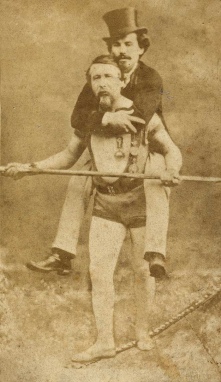 In the middle of the 1800s, the most famous tightrope walker in the world was a man called “The Great Blondin!” Blondin was famous for crossing Niagra Falls on tightrope and people came from all over the world to watch him perform the feat.
In the middle of the 1800s, the most famous tightrope walker in the world was a man called “The Great Blondin!” Blondin was famous for crossing Niagra Falls on tightrope and people came from all over the world to watch him perform the feat.
On one such occasion Blondin, known for his showmanship, called out to the crowd, “I am The Great Blondin! Who believes I can cross over Niagra Falls on this tightrope?”
The crowd was excited and called out to him, “We believe, Blondin, we believe!”
Next, Blondin pulled a handkerchief from his back pocket, tied it around his head and called out: “I am The Great Blondin! Who believes I can cross over Niagra Falls on this tightrope, while blindfolded?”
The crowd, more jazzed up than before, called out, “We believe, Blondin, we believe!”
Then Blondin whisked away a sheet and revealed a wheelbarrow standing behind him. He called out once more to the ecstatic crowd, “I am The Great Blondin! Who believes I can cross over Niagra Falls on this tightrope, blindfolded, while pushing this wheelbarrow?”
The crowd was practically roaring now! “We believe, Blondin, we believe!”
Finally, Blondin, summoned the crowd to silence and spoke once more, “I am The Great Blondin! ….. Now, who wants to get in the wheelbarrow?”
This parable, based on a true event, reminds us that it is far easier to trust God in word than to trust Him in deed. We can say we believe from the safety of the crowd but it is a completely different thing to ride in the wheelbarrow. In the gospels, Jesus says, “Whoever would be my disciple must, deny themselves, take up their cross, and follow me.” As Dietrich Bonhoeffer put it: “When Christ calls a man, he bids him come and die.” Discipleship is a risky proposition. Our safety is not guaranteed. God offers only this assurance: if we surrender ourselves and put our trust in Him, He will never let go!
Whoever has ears to hear, let them hear…


